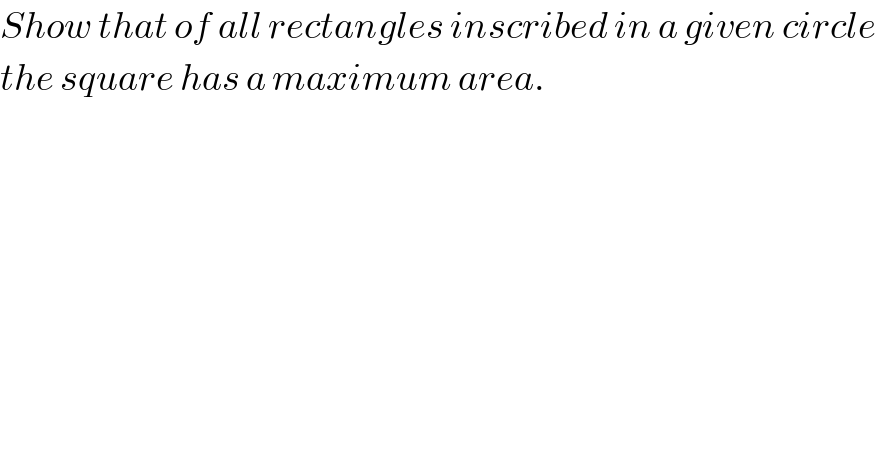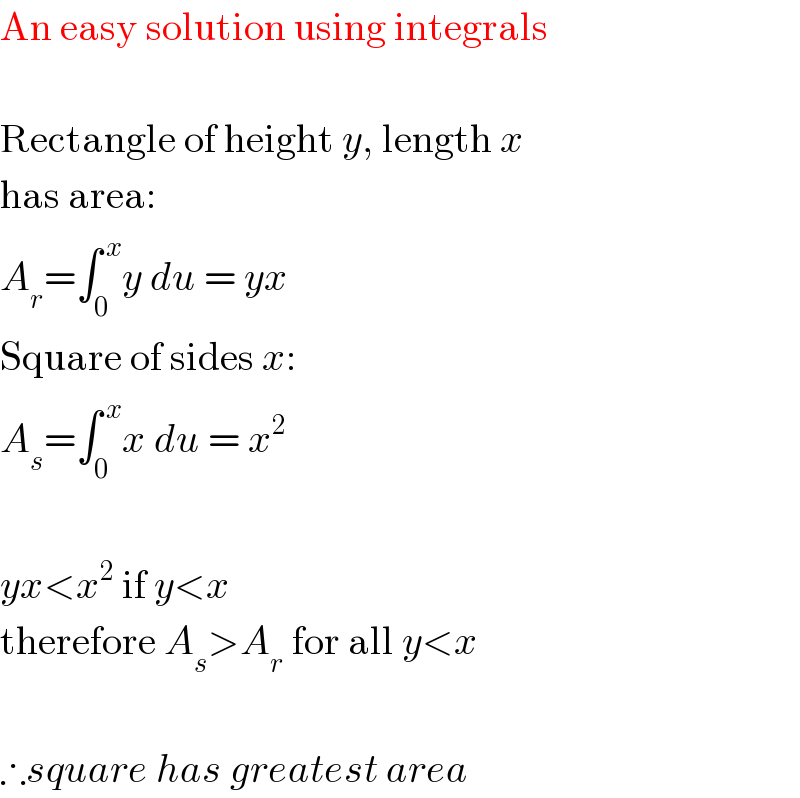
Question Number 6136 by sanusihammed last updated on 15/Jun/16

$${Show}\:{that}\:{of}\:{all}\:{rectangles}\:{inscribed}\:{in}\:{a}\:{given}\:{circle}\: \\ $$$${the}\:{square}\:{has}\:{a}\:{maximum}\:{area}. \\ $$
Answered by Rasheed Soomro last updated on 15/Jun/16

$${All}\:{the}\:{rectangles}\:{inscribed}\:{in}\:{same}\:{circle} \\ $$$${have}\:{equal}\:{diagonals}\:{and}\:{vice}\:{versa}. \\ $$$${Let}\:{the}\:{measure}\:{of}\:{diagonal}\:\:{is}\:{D} \\ $$$${If}\:\boldsymbol{{a}}\:{and}\:\boldsymbol{{b}}\:{are}\:{dimentions}\:{of}\:{rectangle} \\ $$$$\:\:\:\:\:\:\:\:\:\:\:\:\:\:\:\:\:\:{D}=\sqrt{\boldsymbol{{a}}^{\mathrm{2}} +\boldsymbol{{b}}^{\mathrm{2}} } \\ $$$${If}\:\boldsymbol{{s}}\:{is}\:{measure}\:\:{of}\:{the}\:{side}\:{of}\:{square} \\ $$$$\:\:\:\:\:\:\:\:\:\:\:\:\:\:\:\:\:\:{D}=\sqrt{\boldsymbol{{s}}^{\mathrm{2}} +\boldsymbol{{s}}^{\mathrm{2}} }=\sqrt{\mathrm{2}}\:\boldsymbol{{s}} \\ $$$$\:\:\:\:\:\:\:\:\:\:\:\:\:\:\sqrt{\boldsymbol{{a}}^{\mathrm{2}} +\boldsymbol{{b}}^{\mathrm{2}} }=\sqrt{\mathrm{2}}\:\boldsymbol{{s}} \\ $$$$\:\:\:\:\:\:\:\:\:\:\:\:\:\:\:\:\:\boldsymbol{{s}}=\sqrt{\frac{\boldsymbol{{a}}^{\mathrm{2}} +\boldsymbol{{b}}^{\mathrm{2}} }{\mathrm{2}}} \\ $$$$\:\:\:{Area}\:{of}\:{square}=\boldsymbol{{s}}^{\mathrm{2}} =\frac{\boldsymbol{{a}}^{\mathrm{2}} +\boldsymbol{{b}}^{\mathrm{2}} }{\mathrm{2}} \\ $$$$\:\:\:{Area}\:{of}\:{rectangle}=\boldsymbol{{ab}} \\ $$$${Now}\:{we}\:{have}\:{to}\:{prove}\:{that} \\ $$$$\:\:\:\:\:\:\:\:\:{Area}\:{of}\:{square}>{Area}\:{of}\:{rectangle} \\ $$$$\:\:\:\:\:\:\:\:\:\:\:\frac{\boldsymbol{{a}}^{\mathrm{2}} +\boldsymbol{{b}}^{\mathrm{2}} }{\mathrm{2}}>\boldsymbol{{ab}}\:\:\:\:\:\:\forall\boldsymbol{{a}},\boldsymbol{{b}}>\mathrm{0}\:\wedge\:\boldsymbol{{a}}\neq\boldsymbol{{b}} \\ $$$${There}\:{is}\:{a}\:{proved}\:{relation}\:{between}\:{arithmatic} \\ $$$${mean},{geometric}\:{mean}\:{and}\:{harmonic}\:{mean} \\ $$$${which}\:{will}\:{help}\:{us}\:{to}\:{prove}\:{the}\:{above}\:{result}. \\ $$$${If}\:{A},\:{G},\:{H}\:{are}\:{A}.{M}.\:,{positive}\:{G}.{M}.\:{and} \\ $$$${H}.{M}.\:\:{between}\:{any}\:{two}\:{positive}\:{and}\:{unequal} \\ $$$${numbers}\:\boldsymbol{{a}}\:\:{and}\:\:\boldsymbol{{b}}\:\:{then} \\ $$$$\:\:\:\:\:\:\:\:\:\:\:\:\:\:\:\:\:\:\:\:{A}>{G}>{H} \\ $$$$\:\:\:\:\:\:\:\:\:\:\:\:\:\:\frac{\boldsymbol{{a}}+\boldsymbol{{b}}}{\mathrm{2}}>\boldsymbol{{ab}}>\frac{\mathrm{2}\boldsymbol{{ab}}}{\boldsymbol{{a}}+\boldsymbol{{b}}} \\ $$$$\:\:\:\:\:\:\:\:\:\:\:\:\:\:\frac{\boldsymbol{{a}}+\boldsymbol{{b}}}{\mathrm{2}}>\frac{\mathrm{2}\boldsymbol{{ab}}}{\boldsymbol{{a}}+\boldsymbol{{b}}} \\ $$$$\:\:\:\:\:\:\:\:\:\:\:\:\:\:\:\:\frac{\:\left(\boldsymbol{{a}}+\boldsymbol{{b}}\right)^{\mathrm{2}} }{\mathrm{2}}>\mathrm{2}\boldsymbol{{ab}} \\ $$$$\:\:\:\:\:\:\:\:\:\:\:\:\:\:\:\:\frac{\:\boldsymbol{{a}}^{\mathrm{2}} +\mathrm{2}\boldsymbol{{ab}}+\boldsymbol{{b}}^{\mathrm{2}} }{\mathrm{2}}>\mathrm{2}\boldsymbol{{ab}} \\ $$$$\:\:\:\:\:\:\:\:\:\:\:\:\:\:\:\:\:\:\frac{\boldsymbol{{a}}^{\mathrm{2}} }{\mathrm{2}}+\boldsymbol{{ab}}+\frac{\boldsymbol{{b}}^{\mathrm{2}} }{\mathrm{2}}>\mathrm{2}\boldsymbol{{ab}} \\ $$$$\:\:\:\:\:\:\:\:\:\:\:\:\:\:\:\:\:\frac{\boldsymbol{{a}}^{\mathrm{2}} +\boldsymbol{{b}}^{\mathrm{2}} }{\mathrm{2}}>\boldsymbol{{ab}} \\ $$$$\:\:\:\:\:\:\:\:\underset{} {{Area}\:{of}\:{square}}>{Area}\:{of}\:{rectangle} \\ $$$${provided}\:{that}\:{they}\:{have}\:{same}\:{diagonals}.{I}-{E} \\ $$$${they}\:{are}\:{inscribed}\:{in}\:{same}\:{circle} \\ $$$$ \\ $$
Answered by FilupSmith last updated on 15/Jun/16

$$\mathrm{An}\:\mathrm{easy}\:\mathrm{solution}\:\mathrm{using}\:\mathrm{integrals} \\ $$$$\: \\ $$$$\mathrm{Rectangle}\:\mathrm{of}\:\mathrm{height}\:{y},\:\mathrm{length}\:{x} \\ $$$$\mathrm{has}\:\mathrm{area}: \\ $$$${A}_{{r}} =\int_{\mathrm{0}} ^{\:{x}} {y}\:{du}\:=\:{yx} \\ $$$$\mathrm{Square}\:\mathrm{of}\:\mathrm{sides}\:{x}: \\ $$$${A}_{{s}} =\int_{\mathrm{0}} ^{\:{x}} {x}\:{du}\:=\:{x}^{\mathrm{2}} \\ $$$$ \\ $$$${yx}<{x}^{\mathrm{2}} \:\mathrm{if}\:{y}<{x} \\ $$$$\mathrm{therefore}\:{A}_{{s}} >{A}_{{r}} \:\mathrm{for}\:\mathrm{all}\:{y}<{x} \\ $$$$ \\ $$$$\therefore{square}\:{has}\:{greatest}\:{area} \\ $$
Commented by FilupSmith last updated on 15/Jun/16

$$\mathrm{oh},\:\mathrm{i}\:\mathrm{didnt}\:\mathrm{read}\:\mathrm{the}\:\mathrm{part}\:\mathrm{about}\:\mathrm{the}\:\mathrm{cirlce} \\ $$$$\mathrm{sorry},\:\mathrm{but}\:\mathrm{i}\:\mathrm{misread}\:\mathrm{the}\:\mathrm{question} \\ $$
